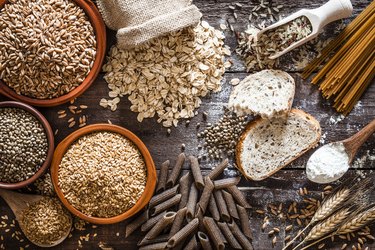
What you decide to eat not only revs up your energy levels, but may also rev up your bowels. Sluggish or lazy bowels occur when the muscles in your colon slow down, resulting in constipation. The National Institutes of Health defines constipation as having fewer than three bowel movements per week or painful bowel movements that are difficult to pass.
Eating a fiber-focused diet can help wake up your colon and improve lazy bowel function. Consult your doctor before making changes to your diet. If you're experiencing severe constipation or constipation in combination with any other symptoms, see your doctor.
Video of the Day
Video of the Day
Fiber for Lazy Bowel
Fiber is a non-digestible carbohydrate found in plant foods. Most Americans do not get enough fiber, according to the Academy of Nutrition and Dietetics.
Upping the fiber in your diet helps soften and bulk up stool, which may alleviate the constipation associated with a lazy bowel. The Academy says you need 14 grams of fiber per 1,000 calories consumed, or 25 grams for women and 38 grams for men.
Sources of Fiber
Good sources of fiber include whole grains, fruits, vegetables, beans and nuts. But when it comes to a lazy bowel, foods rich in insoluble fiber may be most helpful.
Insoluble fiber does not dissolve in water and helps move food through your digestive system, improving regularity. Wheat bran, oat bran, beans, whole-wheat bread, whole-wheat couscous, cucumbers, tomatoes and carrots can help you get more insoluble fiber in your diet.
Add Fiber to Meals
You can easily add fiber to your diet by making small changes to your usual meals and snacks. Increase your fiber intake slowly over the course of a few weeks to prevent abdominal discomfort. Add fiber at breakfast with a high-fiber cereal, or whole grain bread, and fresh fruit.
Make salad a regular side dish with lunch, and top it with beans for extra fiber. At dinner, replace refined grains with whole grains such as brown rice, quinoa or whole-wheat pasta. Fruits at snack time not only help you get more fiber, but also satisfy your sweet tooth.
Up Your Fluid
Making sure you get enough fluid in your diet is also important for a lazy bowel. How much fluid you need each day depends on your climate, activity level, age and medical condition.
A 2010 study published in "Nutrition Review" found that individuals who drank low levels of fluids throughout the day were more likely to experience constipation.
In general, adults should aim for 8 to 12 cups of fluid a day, ideally water. Milk, juice, broth and decaffeinated tea are also good choices. In addition, fruits with high water content, such as watermelon, strawberries, and grapes, count toward your daily fluid goals.
Make Your Diet a Priority
It can be tempting to reach for an over-the-counter laxative or fiber supplement, but it is always best to speak with a medical professional before going that route.
Medications, lifestyle changes, and other health problems can all be causes for constipation. Get your lazy bowel moving by making diet changes and ensuring that you are hydrated throughout the day. Getting enough exercise can also help kick that lazy bowel into gear.